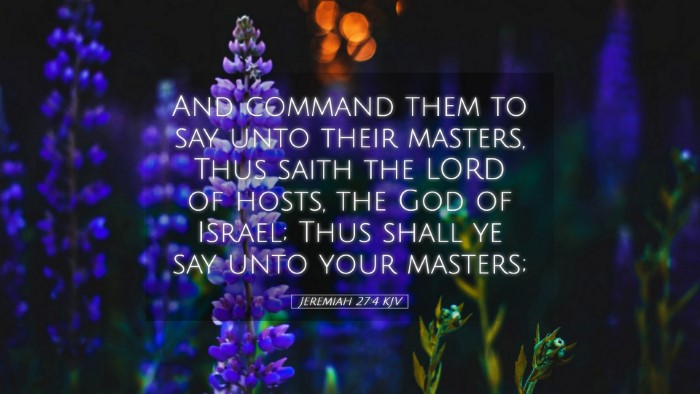Bible Commentary on Jeremiah 27:4
Verse: Jeremiah 27:4 - "And command them to say unto their masters, Thus saith the LORD of hosts, the God of Israel; Thus shall ye say unto your masters."
Introduction
The book of Jeremiah is one of profound significance within the prophetic literature of the Old Testament. In chapter 27, the prophet Jeremiah receives a divine message that reveals God's sovereignty over the nations and His will regarding the impending Babylonian captivity. This particular verse serves as a critical directive not only to the nations surrounding Judah but also to the servants within those nations. Here we will delve into the insights generated by noteworthy public domain commentaries such as those by Matthew Henry, Albert Barnes, and Adam Clarke.
Contextual Analysis
To comprehend the depth of this verse, we must consider its context. The backdrop of Jeremiah 27 is the rising power of Babylon under King Nebuchadnezzar, who was destined to conquer Jerusalem and carry many into exile.
- The Prophetic Role: Jeremiah serves as God's mouthpiece, tasked to communicate God's intentions amidst a tumultuous political landscape. This highlights the weight of prophetic responsibility.
- The Audience: The directive is not just for the Israelites but extends to various "masters," suggesting a universal scope of divine judgment and authority.
Commentary Insights
Matthew Henry's Commentary
Henry emphasizes the importance of obedience to divine revelation. He states that this command illustrates God's sovereignty, as He instructs Jeremiah to communicate directly to the rulers of these nations. This act signifies that even powerful leaders are under God's reign. The term "masters" is indicative of those in authority, who are to be reminded of God's position over their dominion.
Albert Barnes' Notes on the Bible
Barnes elaborates on the significance of the phrase "Thus saith the LORD of hosts." This declaration is crucial as it emphasizes that the message being conveyed is not merely prophetic but divinely ordained. He points out that God's intentions are clearly laid out—that there is an ultimate purpose behind the subjugation of nations under Babylon.
Moreover, Barnes indicates that this verse serves as a reminder that God commands even the rulers of the earth. By instructing the masters, God asserts that their power is subordinate to His divine plan. The implication is that worldly authority must recognize and yield to divine authority.
Adam Clarke’s Commentary
Clarke provides a more detailed exposition on the socio-political implications of this verse. He suggests that the command to communicate directly to their masters indicates a divine warning and an encouragement to submit to God's will during the coming calamity. Clarke asserts that this submission is not a sign of weakness but a recognition of God's ultimate plan for Israel and the surrounding nations.
Furthermore, Clarke emphasizes the notion of God's long-suffering and mercy in warning these nations. The divine command carries with it an invitation to repentance, showcasing God's characteristic desire for all to turn back to Him before judgment befalls them.
Theological Implications
- The Sovereignty of God: This verse and its context encapsulate the profound theological principle of God's sovereignty over human affairs. As much as He is involved in the intimate details of individual lives, He also governs nations, empires, and their rulers.
- The Role of Prophecy: The act of prophecy, as illustrated here, is not simply about foretelling future events, but about proclaiming God's will and challenging those in power to adhere to His commandments.
- God's Desire for Repentance: Even in the face of judgment, God offers words of warning and an opportunity for repentance, highlighting His merciful nature.
Conclusion
In conclusion, Jeremiah 27:4 serves as a profound reminder of God's authority over all creation. For pastors, students, theologians, and scholars, the insights derived from the commentaries underscore the relevance of this passage in understanding divine governance, the function of prophecy, and God's character. As we explore the implications of God's messages delivered through Jeremiah, we are called to reflect on how they apply to our contemporary context of faith, leadership, and submission to God's will.


